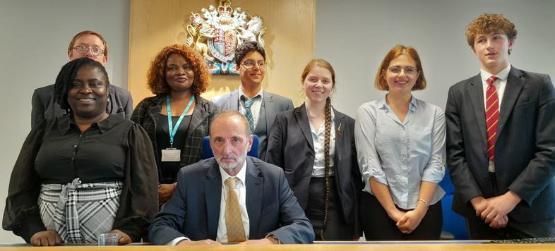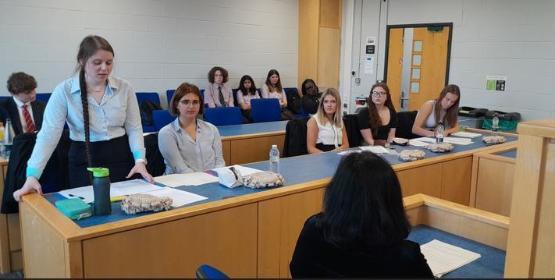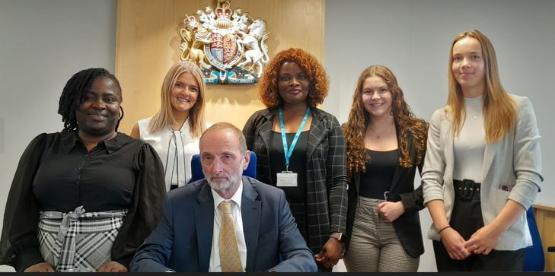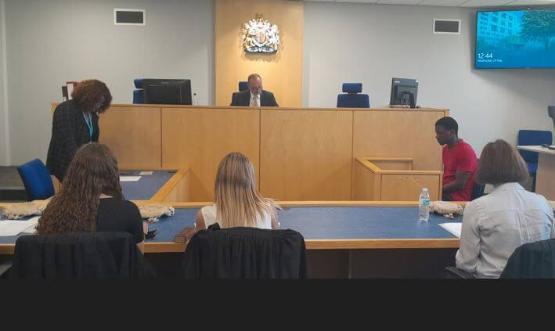Bradford schools have their day in University's court

TWO Bradford schools have gone head to head in the final of the University of Bradford's Mock Trial Competition.
Year 12 pupils from Woodhouse Grove and Bradford Grammar School acted as prosecution and defence respectively at the University’s Lady Hale Court - named after the Yorkshire-born former President of the Supreme Court - in front of circuit judge, His Honour Judge Jonathan Rose
Bradford Grammar was named the winning team, based on their advocacy, knowledge and application of the law, including caselaw, ability to ask questions appropriately, style, courtesy and organisation.
Oliver Tuggey, 17, from Bradford Grammar, said: "I really enjoyed it. The whole process allowed me to learn a lot more about the law and whether it’s something I want to go into. The mock court room is really impressive and it was great to have a real judge, who made it feel very real."
Fellow team mate Tayjus Bhan-Mistry, also 17, said: "It was a complicated case. We did a lot of preparation beforehand but both teams did really well."

Pictured above: Team from Bradford Grammar with Judge Rose and School of Law staff
Six schools took part in the University’s mock trial competition. The first two rounds were conducted online before welcoming the finalists to the university's campus on Wednesday, 24 May.
Judge Rose, who decided the winner along with a panel from the University, including Professor Engobo Emeseh, Head of the Law School, said: "It was an impossible task to choose between the two teams. They are all exceptionally talented. These are students in Year 12, with no professional training in advocacy. I have every confidence that each one of them will be successful in their career in law."
The mock case involved defendant fictional student Joe Brooke, played by first year student David Eke. He was accused of actual bodily harm, contrary to section 47 of the Offences Against the Persons Act 1861, committed against a fellow fictional student, Nat Knight, played by law lecturer Dr Neeti Shikha. Joe Brooke had pushed Nat Knight too hard on a playground swing, which caused her to fall off and left her with debilitating injuries.

Lena Plein (corr), 17, who was part of the three-member Woodhouse Grove team, said: "It was really enjoyable. It surprised me how professional it was and how realistic. There was some pressure because we had the witness statements but we didn’t know what the actors were going to say so there was a lot of thinking on our feet."
Kaitlyn (corr) Walsh, also 17, from Woodhouse Grove, added: “The competition gave us an insight into what it would be like studying law here. It was really helpful in deciding whether law is a route we want to go down. I would definitely recommend it."
Claire (corr) Spencer, business and economics teacher at Woodhouse Grove and former lawyer, said: "Taking part in this competition has boosted the pupils’ confidence massively. Whether they apply to study at university or go straight into jobs, this is something they can put on their personal statements and CVs. It shows they have pushed themselves out of their comfort zones and have had to think on their feet under pressure."
James Reeson, Classics teacher at Bradford Grammar, said: "The University of Bradford has provided the pupils with a unique opportunity to gain experience of what it would be like to be an advocate. The final was particularly exciting: the setting in the Lady Hale mock court, the construction of the case, and the involvement of Judge Rose all brought out the best in the pupils."

Pictured above: Team from Woodhouse Grove with Professor Emeseh and Judge Rose
The mock trial competition for local schools is an annual event at the University, first launched in 2020. This is the second year the final has been held in person at its Lady Hale court room.
None of the pupils involved currently studies law at their schools.
Professor Engobo Emeseh said: "Part of our ethos at the School of Law is that we must be rooted in our community and give back by helping to build the lawyers of tomorrow from our own community.
“A mock trial is a really good way to build students’ skills, not only for those who would like to study law, but for all students in terms of transferable skills, such as communication, advocacy, research, analytical thinking and team working.
"For those who are considering law, it gives them a taste of an aspect of what a career in law might involve. Of course, we would love to welcome them to study with us here at the School of Law. If they do, we are committed to ensuring that they hone their craft in a state of the art facility, a friendly environment with a sense of community, where they will be nurtured and challenged to achieve at a very high standard, both academically in terms of and their legal and employability skills though the opportunities we provide them with.
"I hope they have seen how friendly our law school is and our sense of community, as well as our very high standards in terms of what we deliver to our students and the opportunities they have."

Professor Amir Sharif, Dean of the Faculty of Management, Law and Social Sciences, said: "We are committed to developing the lawyers of the future through our ongoing community and legal firm outreach activity such as this. My congratulations to the winners and we look forward to seeing more students engaging going forward!"
Prior to the competition, Judge Rose promised to act in a "realistic" manner. He added: "My background was not one of a stereotypical lawyer. My parents weren’t lawyers, I didn't know any lawyers.
"I had a fabulous career as a barrister in chambers in Bradford and Leeds and was very fortunate to become a judge. Any one of these pupils could be a judge. They can certainly become solicitors and barristers. If I can encourage even one of them, then that will be as important as the work I do as a judge.
"I want them to understand any of them can have this as a career, if they’re committed, if they work hard and if they’re enthusiastic. It’s a pleasure to come to a university, whether it’s to talk about law, to do something like this or talking to students. You can’t have a career of any sort and not be prepared to put something back for no reason other than that is your duty and your desire."
